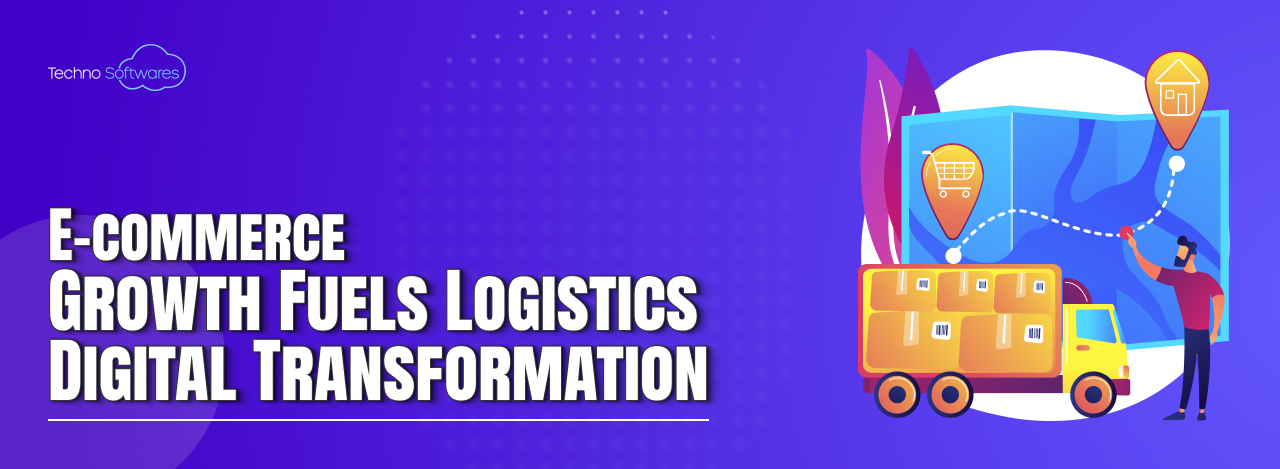How E-commerce Growth is Driving Digital Transformation in Logistics
As we navigate through the digital age, the growth of e-commerce has significantly transformed the logistics landscape. The surge in online shopping has led to an unprecedented demand for efficient and reliable logistics solutions. We have witnessed a shift in consumer behavior, where convenience and speed have become paramount.
This shift has compelled logistics providers to adapt their operations to meet the rising expectations of customers who now expect same-day or next-day delivery. The implications of this growth are profound, as it not only affects how goods are transported but also how warehouses are managed and how inventory is tracked. Moreover, the expansion of e-commerce has led to the emergence of new logistics models.
Traditional supply chains are being re-evaluated, and we are seeing a move towards more decentralized distribution networks. This change allows for quicker response times and better service levels, but it also introduces complexity into the logistics process. As we embrace this evolution, we must recognize that the logistics sector is no longer just a support function; it has become a critical component of the overall customer experience.
The ability to deliver products swiftly and efficiently can be a significant differentiator in a crowded marketplace.
Key Takeaways
- E-commerce growth has significantly impacted logistics, leading to increased demand for efficient and scalable solutions.
- Digital transformation is essential for logistics companies to stay competitive and meet the evolving needs of e-commerce businesses.
- Key challenges in e-commerce logistics include last-mile delivery, inventory management, and order fulfillment.
- Technology solutions such as warehouse management systems and transportation management systems play a crucial role in optimizing e-commerce logistics operations.
- Techno Softwares offers customized technology solutions to address the specific challenges faced by e-commerce logistics, improving efficiency and customer satisfaction.
The Need for Digital Transformation in Logistics
In light of the rapid changes brought about by e-commerce, we find ourselves at a crossroads where digital transformation in logistics is no longer optional; it is essential. The traditional methods of managing logistics operations are becoming increasingly inadequate in addressing the complexities of modern supply chains. We must embrace technology to streamline processes, enhance visibility, and improve overall efficiency.
Digital transformation allows us to leverage data and automation, which can lead to significant cost savings and improved service levels. Furthermore, as we delve deeper into digital transformation, we recognize that it is not just about adopting new technologies; it is about rethinking our entire approach to logistics. We need to foster a culture of innovation within our organizations, encouraging teams to explore new ideas and solutions.
By integrating digital tools such as artificial intelligence, machine learning, and the Internet of Things (IoT), we can create a more agile and responsive logistics framework. This transformation will enable us to anticipate customer needs better and adapt our operations accordingly.
Key Challenges in E-commerce Logistics

Despite the opportunities presented by e-commerce growth, we face several challenges that can hinder our logistics operations. One of the most pressing issues is managing the increased volume of orders while maintaining high service levels. As we strive to meet customer expectations for fast delivery, we often encounter bottlenecks in our supply chains.
These bottlenecks can arise from various factors, including limited warehouse space, inefficient inventory management, and transportation constraints. Additionally, we must contend with the complexities of last-mile delivery, which is often the most challenging aspect of e-commerce logistics. The last mile represents the final leg of the delivery journey, and it is crucial for ensuring customer satisfaction.
However, factors such as traffic congestion, delivery windows, and varying customer preferences can complicate this process. As we work to overcome these challenges, we must also consider the environmental impact of our logistics operations. Striking a balance between efficiency and sustainability is becoming increasingly important as consumers demand greener practices.
The Role of Technology Solutions in E-commerce Logistics
In addressing the challenges we face in e-commerce logistics, technology solutions play a pivotal role. We have access to a wide array of tools that can enhance our operations and improve efficiency. For instance, warehouse management systems (WMS) can optimize inventory tracking and order fulfillment processes, allowing us to manage stock levels more effectively.
By automating routine tasks, we can free up valuable resources and focus on strategic initiatives that drive growth. Moreover, transportation management systems (TMS) enable us to streamline our shipping processes by providing real-time visibility into our supply chains. With these systems in place, we can make data-driven decisions regarding route optimization and carrier selection, ultimately reducing costs and improving delivery times.
As we continue to explore technology solutions, we must also consider the integration of advanced analytics and machine learning algorithms that can help us predict demand patterns and optimize our logistics strategies accordingly.
How Techno Softwares Can Address E-commerce Logistics Challenges
As we seek effective solutions to our e-commerce logistics challenges, Techno Softwares emerges as a valuable partner in this journey. Their innovative software solutions are designed specifically to address the unique needs of e-commerce logistics providers. By leveraging their expertise, we can implement systems that enhance visibility across our supply chains and improve operational efficiency.
Techno Softwares offers comprehensive solutions that encompass everything from inventory management to order fulfillment and last-mile delivery optimization. Their platforms enable us to track shipments in real-time, providing us with critical insights into our logistics operations. This level of visibility allows us to proactively address potential issues before they escalate, ensuring that we maintain high service levels for our customers.
Additionally, their user-friendly interfaces make it easy for our teams to adopt these technologies without extensive training.
Building Customized Technology Solutions for E-commerce Logistics

Recognizing that every organization has unique requirements, we understand the importance of building customized technology solutions for e-commerce logistics. Off-the-shelf software may not always meet our specific needs; therefore, we must collaborate with technology partners like Techno Softwares to develop tailored solutions that align with our operational goals. By engaging in a consultative approach, we can identify pain points within our logistics processes and design systems that address these challenges effectively.
Customization allows us to integrate various functionalities into a single platform, streamlining our operations and enhancing overall efficiency. For instance, we can incorporate features such as automated inventory replenishment, predictive analytics for demand forecasting, and advanced reporting capabilities into our customized solutions. This level of personalization not only improves our operational performance but also empowers us to respond more effectively to changing market conditions.
Leveraging Data Analytics for Improved E-commerce Logistics
In today’s data-driven world, leveraging data analytics is crucial for enhancing our e-commerce logistics operations. We have access to vast amounts of data generated throughout the supply chain, from customer orders to shipping routes and inventory levels. By harnessing this data effectively, we can gain valuable insights that inform our decision-making processes.
Data analytics enables us to identify trends and patterns that may not be immediately apparent. For example, by analyzing historical sales data, we can forecast demand more accurately and adjust our inventory levels accordingly. Additionally, predictive analytics can help us anticipate potential disruptions in our supply chains, allowing us to take proactive measures to mitigate risks.
As we embrace data-driven decision-making, we position ourselves to optimize our logistics operations continually.
The Future of E-commerce Logistics and Digital Transformation
Looking ahead, the future of e-commerce logistics is undoubtedly intertwined with digital transformation. As technology continues to evolve at a rapid pace, we must remain agile and adaptable in our approach to logistics management. The integration of emerging technologies such as artificial intelligence, blockchain, and autonomous vehicles will reshape how we operate within the logistics sector.
We envision a future where logistics processes are fully automated, enabling us to achieve unprecedented levels of efficiency and accuracy. With advancements in robotics and automation technologies, tasks such as picking and packing could be performed with minimal human intervention. Furthermore, blockchain technology has the potential to enhance transparency and traceability within supply chains, fostering trust among stakeholders.
In conclusion, as we embrace the growth of e-commerce and navigate the challenges it presents, digital transformation will be at the forefront of our efforts in logistics management. By leveraging technology solutions and data analytics while building customized systems tailored to our needs, we can position ourselves for success in an increasingly competitive landscape. The future holds immense potential for those willing to innovate and adapt in this dynamic environment.
If you are interested in learning more about how Techno Softwares can help improve your e-commerce logistics, check out their article on improving Shopify store performance. This article discusses the importance of optimizing your online store to enhance customer experience and drive sales. Techno Softwares also offers insights on enhancing software quality through regression testing and improving scalable app security with identity and access management (IAM) in their other informative articles.
FAQs
What is e-commerce logistics?
E-commerce logistics refers to the processes and activities involved in the storage, transportation, and delivery of goods purchased online. It includes order fulfillment, inventory management, shipping, and returns processing.
How is e-commerce growth driving digital transformation in logistics?
The rapid growth of e-commerce has led to increased demand for efficient and streamlined logistics processes. This has driven the need for digital transformation in logistics, including the adoption of technologies such as warehouse management systems, transportation management systems, and real-time tracking solutions.
What are the benefits of digital transformation in e-commerce logistics?
Digital transformation in e-commerce logistics can lead to improved efficiency, cost savings, better inventory management, faster order fulfillment, and enhanced customer experience. It also enables logistics companies to adapt to the changing demands of e-commerce and stay competitive in the market.
How can Techno Softwares build technology solutions for e-commerce logistics?
Techno Softwares can develop custom technology solutions for e-commerce logistics, including warehouse management systems, transportation management systems, order management systems, and real-time tracking and visibility solutions. These solutions are designed to streamline logistics processes, improve efficiency, and enhance the overall e-commerce logistics experience.





